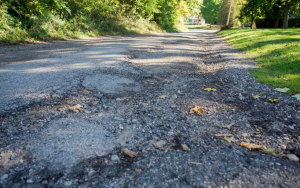 This is the first part of a two part feature on roads. Pick up next week’s Collegian to find part 2 of this story in which city government’s current plans to finance road funding and its plans to fight the upcoming winter will be explained.
This is the first part of a two part feature on roads. Pick up next week’s Collegian to find part 2 of this story in which city government’s current plans to finance road funding and its plans to fight the upcoming winter will be explained.
Freeze and thaw is fast approaching. But last winter’s road damage hasn’t been fixed, and the city is struggling to generate enough revenue to keep up with repairs.
A significant reduction in state road funding has left the city scrambling to fix deteriorating roads with massive potholes like “Lake Lovinger” on Wolcott Street. As another winter season comes, some city residents believe that the condition of the roads will only deteriorate further.
“I would see them getting worse from winter,” resident Caroline Stuck said. “The cracks are just going to get wider.”
Another point of frustration for city residents is that roads which receive funding from the state are in much better shape than the local roads, which the city is fully responsible for maintaining.
“I know all these little side streets aren’t a priority,” resident Robert Peddicord said about Marion Street.
Although crumbling roads have plagued Hillsdale for more than a decade, city council has yet to generate the revenue to fix them. But at a recent Department of Public Services meeting on Sept. 29, the council discussed possible measures to aggressively address the road-funding issue with a mix of new ideas and repackaged old ones.
Current State of the Roads
Local roads in Hillsdale are in the worst shape.
Many of the streets that Hillsdale residents called the worst – Westwood Street, Highland Avenue, Hillcrest Drive, Howder Street., Marion Street, and Vine Street – are local roads that Hillsdale is fully responsible for maintaining.
Hillsdale has three categories of roads within its limits: state highways that are fully funded by the state; trunkline roads that receive state matching money; and local roads that are totally maintained by the city.
M-99, a state highway, is well maintained.
State Street, a trunkline road used by numerous people in the surrounding community, was recently fixed up to Wolcott Street with plans to continue the road repair up to city limits by 2015 or 2016.
Vine Street, a local road only half a mile from campus, is crumbling, and both sides of the street have been reduced to rubble, leaving only a bumpy strip of concrete going down the center of the street.
“It is like pothole city,” Stuck said of Vine Street.
Much of Peddicord’s curb on Marion Street has been eroded and only half of his street is paved, while the other half is covered in pothole patches. According to Peddicord, his street is a “joke” with local bus drivers.
“This is embarrassing,” he said.
The roads in Hillsdale are also frustrating to members of Hillsdale city government, and generating revenue to fix more roads is a daily struggle, said Mary Wolfram, Hillsdale’s economic development coordinator.
Mayor Scott Sessions said at this point the city is just going to “pinch pennies” and save up and get state matching.
Councilman Patrick Flannery is more optimistic.
“I’m frustrated that more work hasn’t been [done] on it. I am hopeful we’ll find more money as we go through the budget process,” Flannery said.
According to Flannery, the city is making “strategic plans” to fix roads and not just trying to manage a “crisis.”
Causes of the Roads’ Deterioration
Mary Wolfram called the destruction of the roads in Hillsdale a “perfect storm” – the result of harsh weather conditions, as well as rising road costs and decreasing state revenue sharing. According to her, the city has known for over a decade that work needs to be done on the roads, but had no political will until recently.
While there are many reasons why the roads deteriorate, the reason they often can’t be fixed is simple.
“In truth they’re not doing anything, but it’s because there’s not any money,” Mary Wolfram said.
Still, she called Hillsdale “very fiscally responsible,” without debt and outstanding bonds.
According to Hillsdale Financial Director Bonnie Tew, Hillsdale city property taxes only pay for emergency services.
Furthermore, a large amount of the property in Hillsdale is not taxable. Property owned by the college is among those tax exempt properties, according to Professor of Economics Gary Wolfram.
At the same time, Mary Wolfram said that a contractor hired by the city estimated it would cost $39 million to fix Hillsdale’s roads.
Since all of the city’s tax funds go toward paying for city emergency services, any road repairs have to be paid for with state money. The city of Hillsdale receives state funding for roads through three avenues: constitutional revenue sharing; Act 51 “gas tax” money; and statutory revenue sharing which is set each year in the state budget.
Though constitutional revenue sharing is guaranteed, Act 51 money has been dropping since 2004, and statutory revenue sharing has significantly decreased in the last 10 years, Gary Wolfram said.
He said that as state revenue sharing decreased during the last decade, Hillsdale stayed out of debt by not fixing roads. Instead, it focused on road maintenance.
In the meantime, while the tough questions about road funding are decided by Hillsdale city government, residents of Hillsdale still have to deal with crumbling local roads.
“It’s a good town to live in, I love to live here, but I hate my road,” Peddicord said.
